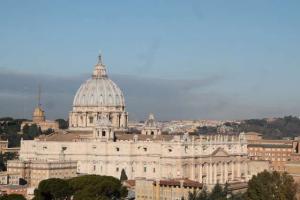We ask you, urgently: don’t scroll past this
Dear readers, Catholic Online was de-platformed by Shopify for our pro-life beliefs. They shut down our Catholic Online, Catholic Online School, Prayer Candles, and Catholic Online Learning Resources—essential faith tools serving over 1.4 million students and millions of families worldwide. Our founders, now in their 70's, just gave their entire life savings to protect this mission. But fewer than 2% of readers donate. If everyone gave just $5, the cost of a coffee, we could rebuild stronger and keep Catholic education free for all. Stand with us in faith. Thank you.Help Now >
Analysis: Power, and its appearance, in Vatican curial reform
FREE Catholic Classes
In the coming months, Pope Francis is expected to approve a final draft of a new governing constitution for the Roman Curia. Evangelium praedicate, as it is expected to be called, will mark the culmination of six years of reforming efforts led by the pope's Council of Cardinals.

Highlights
Vatican City, (CNA) - As the document gets closer to publication, some members of Roman Curia have expressed concern about the document's current draft form, especially as it relates to the possibility of more senior roles for lay men and women.
The constitution is expected to continue the work of combining smaller "pontifical councils" with the larger, better known, "congregations" of the Vatican Curia. The stated aim of such reforms is to provide a more efficient bureaucracy, better suited to serving the pope and dioceses around the world.
Commentary has focused on a supposedly revised order of seniority among the combined curial departments, with some media outlets predicting a relegation of status for the Congregation for the Doctrine of the Faith in favor of Propaganda Fide.
The ecclesiological problems with that forecast are well known; Francis has himself insisted that "all dicasteries report directly to the pope" and that reform must proceed "on the basis of the principle that all dicasteries are juridically equal."
And sources familiar with the draft text have noted that, while departmental seniority may be a red herring, the exercise of authority within departments is a more significant issue. Specifically, curial officials say, members of the C6 (formerly the C9) have been considering how lay men and women might assume senior leadership roles in the consolidated curial departments.
That possibility is already unfolding. Last year, a reconstituted Dicastery for Communications became the first curial department to have a layman as prefect. Francis has also appointed two women to serve as undersecretaries at the Dicastery for Laity, Family and Life. Laity also fill senior positions at the Secretariat for the Economy.
At this point in curial organization, according to sources familiar with the reforming efforts, some members of the C6 are pushing for the appointment of lay Catholics to positions traditionally held by cardinals.
While allowing laity to occupy more senior Vatican offices has been a much-discussed ambition in curial reform, it has generated concern among many officials.
"There is definitely a push to have a layman, preferably a woman, serve in a role traditionally and prominently held by a cardinal," one Vatican official familiar with the drafting process told CNA.
"But there is maybe more enthusiasm than understanding in these ideas."
Many aspects of Church life and governance require the approval of a Roman congregation acting on authority delegated by the pope, including, for example, new translations of the liturgy or the sale of Church patrimony above certain set amounts.
Some curial officials warn that reform efforts which ignore the curia's theological link to the exercise of papal authority present a host of problems, legal and ecclesiological. Central to the issue is a theological debate about which roles in the Church's governance require sacramental ordination, and which can be filled by lay people.
Canon law defines ordination as a necessary qualification for the exercise of the power of governance. Lay people '" according to the Code of Canon Law '" can "cooperate" in the exercise, but not exercise it in their own right.
"It can be good to have lay people in senior roles," one curial archbishop who has seen a recent draft of the new constitution told CNA.
"But you cannot have laity exercising the power of governance on their own, this is clear."
In practice, lay and clerical cooperation can be seen at the diocesan level, where, for example, lay canonists serve as judges on marriage tribunals. While lay judges may write the consensus opinions of the court, they make up a minority on judging panels, which are always chaired by a cleric.
Lay people may serve in senior diocesan roles, such as chancellor, but not in roles with a stable governing function, like vicar general. According to those working in the Roman curia, adopting a similar model in Vatican governance is not impossible.
"Certainly you could have a lay secretary of a dicastery, with acts which exercise the delegated power of governance being signed also by a prefect-cleric," the archbishop said. "But to have a lay prefect of [for example] the CICLSAL [the department for religious orders] would mean having the pope sign everything in forma specifica for it to have authority."
While canonists point out what they see as a potentially flawed ecclesiology in attempting to invest lay officials with the theoretical power to tell bishops or religious superiors what to do, curial officials warn that the attempt could backfire even as a gesture - noting that Rome had recently intervened to prevent similar efforts.
"They [C6] are speaking about 'empowered' lay leadership in the curia - I wonder how that will strike the Americans. Compared to a [lay] prefect of a governing dicastery, what they proposed [at the USCCB autumn assembly in Baltimore last year] is modest, and they were told numquam,' " the Vatican official said.
Others close to the C6 have suggested that the push for lay leadership is actually less about empowering lay officials and more about draining power away from Rome altogether.
"There is a minority that sees the laity as a way to break the curia's role," one priest close to the C6 told CNA. "Give them the jobs they cannot do and give the power to actually do them to the episcopal conferences."
The priest explained that since curial exercise of governance cannot be given to lay people, even if given prominent leadership positions, the exercise of that power would automatically revert back to the pope "unless it is delegated further down."
"At least some of the [C6] cardinals see lay prefects as a way of cutting back Roman power, not just [of] the curia but [of] the pope. If you have lay prefects, you have to limit the competence [of the dicastery], and you give whatever they cannot do to the bishops' conferences."
"Rome gets the power of appearance of lay people in charge, lay people get the appearance of power, and the conferences get the real power," the priest explained, "and they call it subsidiarity."
While the coming weeks will likely see further discussion of the new Vatican constitution's contents and release, it is clear nothing has made it past the draft stage yet.
"There is much [wider] consultation which must still happen," the curial archbishop said. "We hope there will be more understanding after that. Too much now is the fruit of a few - what touches all must be approved by all."
---
'Help Give every Student and Teacher FREE resources for a world-class Moral Catholic Education'
Copyright 2021 - Distributed by Catholic Online
Join the Movement
When you sign up below, you don't just join an email list - you're joining an entire movement for Free world class Catholic education.

-

-
Mysteries of the Rosary
-
St. Faustina Kowalska
-
Litany of the Blessed Virgin Mary
-
Saint of the Day for Wednesday, Oct 4th, 2023
-
Popular Saints
-
St. Francis of Assisi
-
Bible
-
Female / Women Saints
-
7 Morning Prayers you need to get your day started with God
-
Litany of the Blessed Virgin Mary
5 Ways to keep Jesus in your Christmas celebrations this year
-

Get your oven mitts ready, it's time to bake Christmas cookies!
-

Celebrate Sunday Mass - 12.22.24
-
Bone Box Inscribed with Name of Jesus' Brother Unveiled as 'Most Significant Relic from Time of Christ'
-
Miracle of St. Januarius' Blood Liquefies in Naples
Daily Catholic
 Daily Readings for Tuesday, December 24, 2024
Daily Readings for Tuesday, December 24, 2024St. Adele: Saint of the Day for Tuesday, December 24, 2024
 Christmas Prayer: Prayer of the Day for Tuesday, December 24, 2024
Christmas Prayer: Prayer of the Day for Tuesday, December 24, 2024- Daily Readings for Monday, December 23, 2024
- St. John of Kanty: Saint of the Day for Monday, December 23, 2024
- Christmas Prayer: Prayer of the Day for Monday, December 23, 2024
![]()
Copyright 2024 Catholic Online. All materials contained on this site, whether written, audible or visual are the exclusive property of Catholic Online and are protected under U.S. and International copyright laws, © Copyright 2024 Catholic Online. Any unauthorized use, without prior written consent of Catholic Online is strictly forbidden and prohibited.
Catholic Online is a Project of Your Catholic Voice Foundation, a Not-for-Profit Corporation. Your Catholic Voice Foundation has been granted a recognition of tax exemption under Section 501(c)(3) of the Internal Revenue Code. Federal Tax Identification Number: 81-0596847. Your gift is tax-deductible as allowed by law.








 Daily Readings for Tuesday, December 24, 2024
Daily Readings for Tuesday, December 24, 2024 St. Adele: Saint of the Day for Tuesday, December 24, 2024
St. Adele: Saint of the Day for Tuesday, December 24, 2024 Christmas Prayer: Prayer of the Day for Tuesday, December 24, 2024
Christmas Prayer: Prayer of the Day for Tuesday, December 24, 2024

